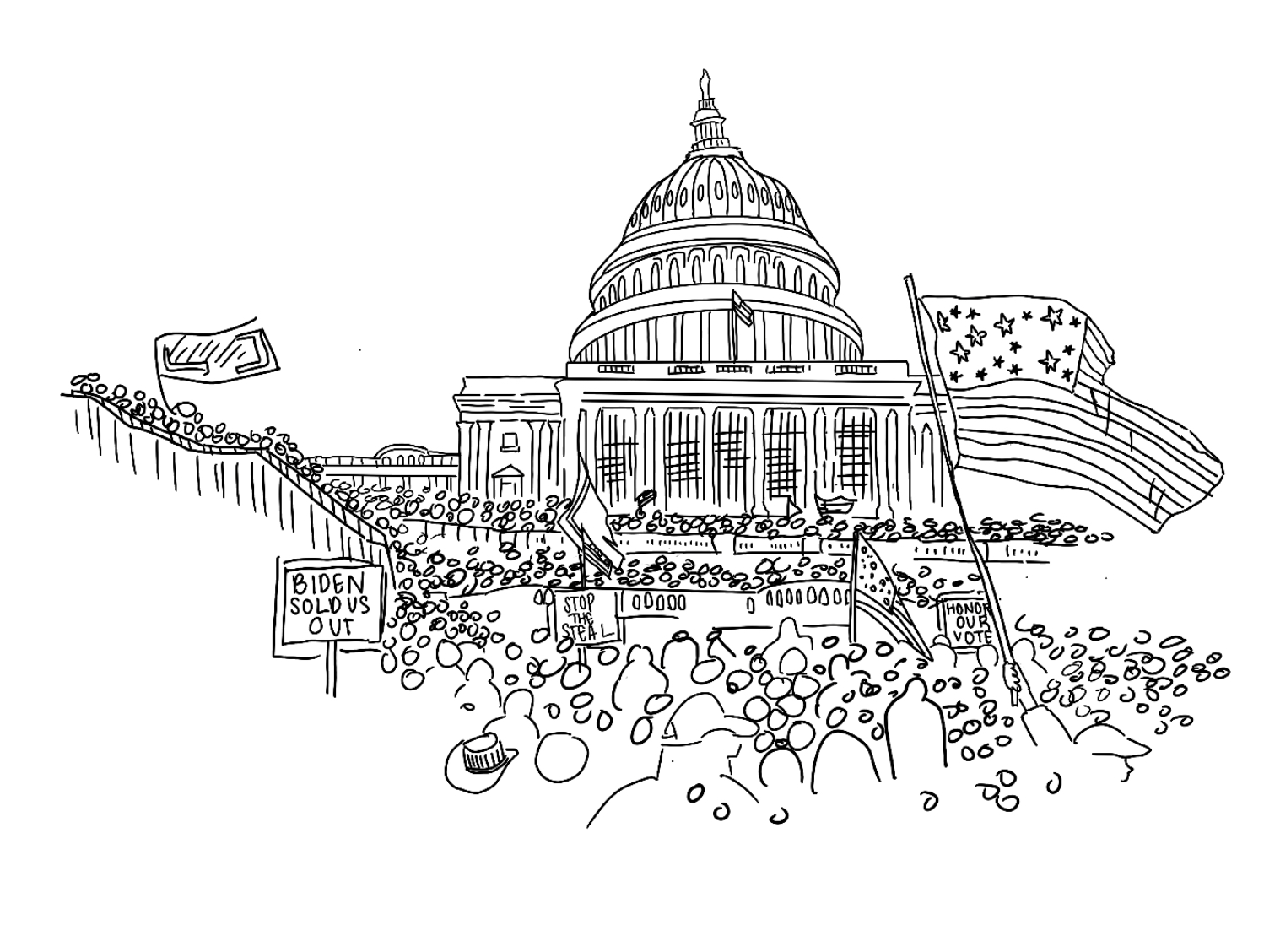Amidst a nationwide wave of anxiety around political extremism and threats to democracy, individuals throughout Lick-Wilmerding High School are confronting these issues, seeking to understand and resist the spread of right-wing extremism in and beyond their communities.
A February 2025 Gallup poll found that only 34% of Americans identify as politically moderate, returning to a historic low. Over a quarter of Americans believe political extremism is the largest threat to the United States, according to a Reuters/Ipsos poll conducted last month.
This trend is evident in the radical rhetoric and policies of President Donald J. Trump. As his power and influence have grown, so too has political extremism.
In a May 2025 interview with NBC, when asked if he needed to uphold the Constitution, President Trump said “I don’t know,” directly challenging democratic institutions. Additionally, he has aligned with right-wing extremist groups, such as the Three Percenters, the Proud Boys and the Oath Keepers. The Southern Poverty Law Center (SPLC) considers the latter two among the largest anti-government groups today.
“Extremism of any kind can be very dangerous because it can become violent, and leads to individuals never speaking to others with alternate perspectives,” said Carrie Maslow, LWHS’s Psychology, and Anatomy and Physiology teacher. “We are seeing a widening rift between people who hold different beliefs.”
Far-right groups often center around “traditional” values, taking harsh anti-immigration, anti-feminist and anti-LGBTQ+ stances. Their opposition to progressive movements sometimes manifests violently, seen especially within 2017’s “Unite the Right” white supremacist rally, and on January 6, 2021, with the insurection at the Capitol.
While supporters of these movements tout these events as expressions of First Amendment rights, some students, like Gigi Donohoe ’25, see them differently. “I struggle to understand how people discredit the existence of trans people or queer people as a part of what they fight for,” she said. “Right wing radicalism takes conservative values to the next level, fueled by hate and fear.”
Technology and social media perpetuate the spread of radical views, which are spread across both mainstream platforms such as X, Facebook and YouTube, and less-moderated platforms such as TruthSocial, Gab and Rumble. A January 2025 study from Cornell University found online extremism fuels the formation, expansion and militarization of these extreme communities. Loosely moderated platforms allow for the spread of harmful ideologies, the coordination of violent activities and the recruitment of members, who can be drawn to the charismatic and persuasive personalities of right-wing leaders such as Andrew Tate, Jack Posobiec and Charlie Kirk.
In-person events also mobilize support. Kirk, for example, spoke at San Francisco State University on May 6, 2025, expanding his reach through an event hosted by his organization, Turning Point USA, which advocates for conservative values, targeting young individuals on high school, college and university campuses.
According to a June 2024 SPLC report, male supremacy plays an integral role in hard-right radicalization. These groups target young white men, strategically appealing to those alienated due to interests, socioeconomic status or sexual dissatisfaction.
“Male supremacist narratives align the personal experiences and perceptions of young men with broader political problems identified by extremist movements,” the report stated.
“The newness of trying to define oneself allows young people to fall under the sway of someone with a powerful idea,” said LWHS’s metal shop teacher Jeremy Kaplan. He attended the Privilege Institute’s White Privilege Conference alongside LWHS chemistry teacher Laralyn Bergstedt, a chemistry teacher at LWHS, and students Lila Range ’26 and Marcel Bihan ’25.
This March 2025 conference brought individuals of many races together to explore today’s political and social division. “We spoke about right-wing radicalization, white supremacy’s roots in Christianity and how it shapes our everyday life,” Bihan said.
Kaplan attributes the growth of right-wing ideals among young men to society’s expectations of men and the endurance of patriarchal systems that emphasize being physically dominant and confrontational.
“The United States is returning to its original sin, that of white supremacy and racism. We must not allow it to continue,” said Mark Montgomery, who facilitated a men’s wellness space during LWHS’s March 14th Teach-In Day and participates in many different men’s affinity spaces. This belief is echoed by Avery Pickford, who teaches Pre-Calculus, Calculus and Statistics at LWHS and leads the Antiracist White Alliance Group.
“Negative cultures — white supremacist, misogynist or rape cultures — they have clear victims, but hurt everyone,” said Pickford. “If we want to care for the most vulnerable, we must speak to seventeen-year-old white boys about the ways that these cultures hurt them too.”
Gavin Cameron ’26 set out to do just that when he founded a men’s affinity group, known as the Men’s Wellness Group, alongside Cillian Stanley ’26. “I realized being vulnerable and talking about your feelings and problems is so important for young men, especially men in this generation who are increasingly disconnected from each other,” said Cameron.
At Men’s Wellness Group meetings, male-identifying students discuss insecurities, masculinity and beliefs. “Talking to each other and acknowledging people’s complex views are the best things we can do,” Cameron added. These spaces aim to reduce stigma by allowing men to build a community in which emotions and personal struggles are not avoided as they are elsewhere. “These spaces provide a safety net,” he said.
But young white men are not the only ones susceptible to radicalization. Kaplan acknowledged the variety of different people who are radicalized. “Anyone can find themselves entering an echo chamber rather than a heterogenous community with people who have different ideas,” he said. He believes society’s growing isolation enables extremism.
In addition to cultivating safe spaces, Joe Lu ’26 believes that combating political extremism requires individuals to bridge ideological gaps through open dialogue. “The best way to bring someone out of radical spaces is to bring them into conversation,” he said, noting that directly attacking radicalized people only drives them deeper into harmful communities. “We need to unite people even though we do not agree with them,” said Lu.
“When we want so badly to be right and to belong, it can be terrifying, leading to extreme or irrational thoughts and actions,” Maslow said. “But there is hope to be found through our conversations, through our relationships with others and through our communities.”






Top https://shorturl.fm/YvSxU